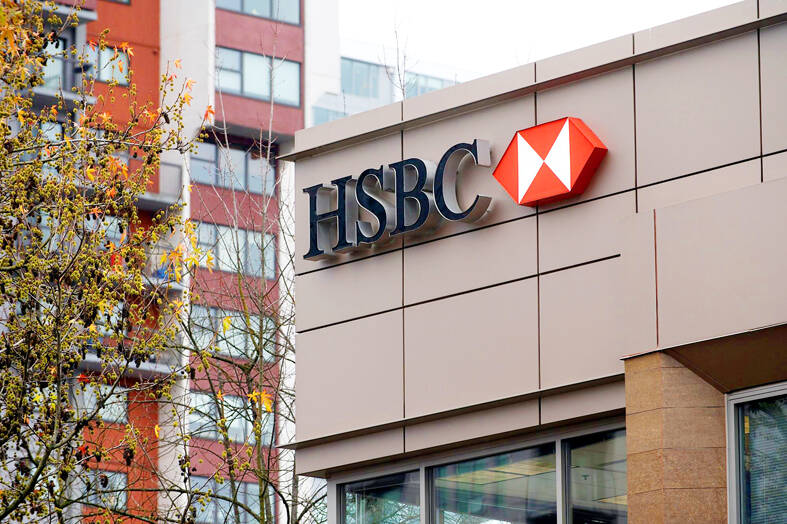HSBC Holdings PLC shares rose after the lender agreed to sell its Canadian unit for C$13.5 billion (US$10 billion) in cash and said it is “proactively” considering a one-time dividend or fresh stock buyback.
The shares gained as much as 3 percent in Hong Kong early yesterday, the biggest gain since Nov. 7.
The London-headquartered lender’s dividend payout is an important focus for Hong Kong’s retail base, which historically has owned a large chunk of the bank. The lender caused an uproar in the territory in 2020 when it halted dividend payments at the request of British regulators.

Photo: Bloomberg
HSBC is under pressure from Ping An Insurance Group Co (平安保險集團) of China, its largest shareholder, which has complained about its strategy and poor returns compared with other banks. Ping An has pushed HSBC to consider a spinoff of its Asian operations, a move the bank has rejected.
The news of sale was welcomed by Christine Fong Kwok-shan (方國珊), a councilor for Hong Kong’s Sai Kung District, who has previously led local investors in trying to make claims against the lender for not paying dividends.
“Certainly we welcome they may consider to have a special dividend,” Fong said. “We have to remind HSBC that they should count the last time they revoked the dividend issue, they should add it up and reissue the dividend to us again.”
Fong represents about 500 minority shareholders that support a spinoff of HSBC’s Asian business. She said she considers the sale a “first step,” adding that there is no change in the minority shareholders’ push for HSBC to reorganize its business and refocus on Asia.
HSBC said any distributions related to the deal is likely to be from early 2024 onward, following completion of the transaction.
Meanwhile, Royal Bank of Canada’s planned acquisition of HSBC’s Canadian unit would expand its lead in the country’s heavily concentrated financial market, bolstering its dealings with firms and wealthy individuals, while potentially drawing scrutiny from regulators.
Royal Bank’s rationale for buying HSBC Canada, the country’s seventh-largest bank, centers on its ability to wring costs from the business while cross-selling new products such as credit cards and mutual funds.
While the deal adds only 130 branches and C$134 billion in assets — a fraction of Royal Bank’s nearly 1,200 branches and C$1.8 trillion in assets — it is Royal Bank’s largest acquisition ever and represents a rare chance to quickly grab market share in a Canadian banking landscape dominated by six large firms.
“It’s a unique and once-in-a-generation opportunity to leverage all the investments we’ve already made in building a world-class retail and commercial bank in Canada,” Royal Bank chief executive officer Dave McKay said on a conference call with analysts on Tuesday.
Royal Bank plans to keep the “vast majority” of HSBC Canada employees, although it is too early to tell how many jobs might be eliminated, McKay said on a call with reporters.
Royal Bank has 6,000 open jobs it is looking to fill, so it views the HSBC deal partly as talent acquisition, he said.

Real estate agent and property developer JSL Construction & Development Co (愛山林) led the average compensation rankings among companies listed on the Taiwan Stock Exchange (TWSE) last year, while contract chipmaker Taiwan Semiconductor Manufacturing Co (TSMC, 台積電) finished 14th. JSL Construction paid its employees total average compensation of NT$4.78 million (US$159,701), down 13.5 percent from a year earlier, but still ahead of the most profitable listed tech giants, including TSMC, TWSE data showed. Last year, the average compensation (which includes salary, overtime, bonuses and allowances) paid by TSMC rose 21.6 percent to reach about NT$3.33 million, lifting its ranking by 10 notches

Popular vape brands such as Geek Bar might get more expensive in the US — if you can find them at all. Shipments of vapes from China to the US ground to a near halt last month from a year ago, official data showed, hit by US President Donald Trump’s tariffs and a crackdown on unauthorized e-cigarettes in the world’s biggest market for smoking alternatives. That includes Geek Bar, a brand of flavored vapes that is not authorized to sell in the US, but which had been widely available due to porous import controls. One retailer, who asked not to be named, because

SEASONAL WEAKNESS: The combined revenue of the top 10 foundries fell 5.4%, but rush orders and China’s subsidies partially offset slowing demand Taiwan Semiconductor Manufacturing Co (TSMC, 台積電) further solidified its dominance in the global wafer foundry business in the first quarter of this year, remaining far ahead of its closest rival, Samsung Electronics Co, TrendForce Corp (集邦科技) said yesterday. TSMC posted US$25.52 billion in sales in the January-to-March period, down 5 percent from the previous quarter, but its market share rose from 67.1 percent the previous quarter to 67.6 percent, TrendForce said in a report. While smartphone-related wafer shipments declined in the first quarter due to seasonal factors, solid demand for artificial intelligence (AI) and high-performance computing (HPC) devices and urgent TV-related orders

MINERAL DIPLOMACY: The Chinese commerce ministry said it approved applications for the export of rare earths in a move that could help ease US-China trade tensions Chinese Vice Premier He Lifeng (何立峰) is today to meet a US delegation for talks in the UK, Beijing announced on Saturday amid a fragile truce in the trade dispute between the two powers. He is to visit the UK from yesterday to Friday at the invitation of the British government, the Chinese Ministry of Foreign Affairs said in a statement. He and US representatives are to cochair the first meeting of the US-China economic and trade consultation mechanism, it said. US President Donald Trump on Friday announced that a new round of trade talks with China would start in London beginning today,